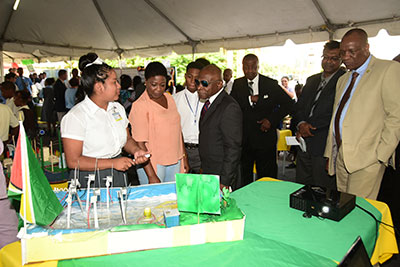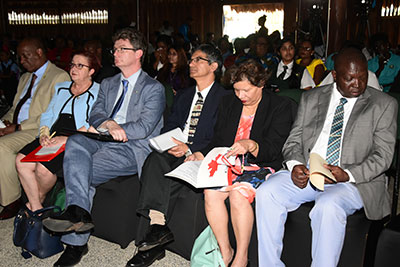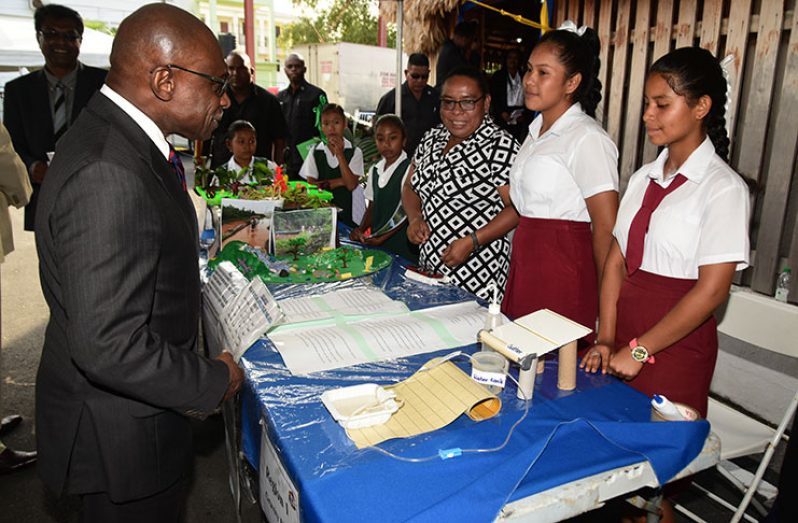STUDENTS of the 10 administrative regions presented a grand exhibition of innovative projects to combat climate change in accordance with the National Assembly of the Parliament of Guyana’s celebration of Commonwealth Day 2018.
The event which saw a large representation from government, the diplomatic corps and other dignitaries was held at the Umana Yana on Monday under the theme “Towards a common future”.
It was attended by several local notables, including acting President and Minister of Foreign Affairs Carl Greenidge, who interacted with the students on the motivations behind their projects.

The projects addressed issues such as climate literacy, wind turbines as alternative energy, waste disposal, tree planting, upcycling and eco-tourism.
During the formal ceremony, Greenidge said he was impressed by the enthusiasm and clarity by which the students were able to explain their exhibits and centred his brief remarks on the importance of youth involvement in climate change.
“It is important that young people see that we are a reflective and organised people in confronting the future. We don’t panic at the sight of something new or of something different and that we can organise ourselves,” he said.
He added: “We must share with them and ensure that we imbue in them a systematic and fearless approach to the future.”
Also addressing the gathering was Opposition Chief Whip Gail Teixeira, who said the fight to protect the earth from climate change is one that can unite the world and called for the “gap in finance” for developing countries fighting climate change to be filled.
She said democracy and climate change are critical and fundamental facets to protecting the planet and noted the need for good governance, inclusivity and diversity as other aspects that play major roles.

Speaking briefly on the matter of oil and gas, the Opposition Chief Whip said the revenues originating from the emerging sector need to be injected into the cause of mainstreaming climate change and renewable energy.
“We must understand that gas… is finite and will run out whether in 20 years, or 30 years, or 40 years so we need to always keep our sights on harnessing renewable energy,” she said.
Minister of State Joseph Harmon began his brief statement by expressing his satisfaction at the level at which the students were able to explain complex subjects like Kinetic energy, adding that it is proof that the country’s education system is moving forward in the right direction.
Despite the fact that Guyana’s two main political parties are known for their disagreement in visions and policies, Harmon, in response to Teixeira’s previous remarks, said efforts to combat climate change is a position shared by both sides.
He highlighted some of the work of the Commonwealth over the years, particularly its assistance to small states.
“The Commonwealth remains at the forefront of policy research and global advocacy to assist small states to build resilience, access financing, alleviate debt burdens and devise measures to respond to natural disasters and the impacts of climate change,” the minister of state said.
Harmon also pointed out that Guyana is set to host the 12th Biennial Conference of the Commonwealth Association for Public Administration and Management (CAPAM) this October, which will facilitate knowledge exchange and networking.
Addressing climate change from the perspective of India which joined the Commonwealth nations in 1947 was Charge D’Affaires of the High Commission of India (ag) Rajender Perindia.
He said India has taken up several initiatives to explore and implement solutions to climate change and that existing Guyana-India agreements help to further promote the cause of a green world powered by renewable energy.
“India is trying its best to make its role compatible as a responsible and enlightened member of the international community, ready to make its contribution to the solution of a global challenge which impacts on humanity as a whole,” the Charge D’Affaires said.
In her remarks, High Commissioner of Canada to Guyana, Lilian Chatterjee, said rising sea levels, hurricanes and other extreme events continue to affect many Commonwealth countries and, as such, working together must be a priority.
“Our future depends upon how we navigate our way through this and how we build global resilience to face it. Canada is a committed global partner on climate change.
“Our fundamental values mirror that of the commonwealth and were adumbrated in our 2018 budget presentation. Taking care of each other can lead to stronger growth and better outcomes,” she said.
Last year, Canada pledged CDN $100M over a five-year period to assist in the rebuilding of Caribbean states ravaged by hurricanes Irma and Maria.
British High Commissioner to Guyana Greg Quinn said the Commonwealth is more relevant today than it ever was and its member states must continue to use this form of unity and collective efforts to their advantage.
“The Commonwealth has deep roots and profound strengths. We must use those strengths to face challenges that exist around global trade, security, democracy, good governance and inclusivity.
“Together we have the chance to build a reformed and revitalised Commonwealth and the UK is determined to help carry forward that agenda for the long term,” Quinn remarked.
In closing, the Speaker of the National Assembly, Dr Barton Scotland thanked the gathering for its favourable turn out and the schools for their participation in the Commonwealth Day celebration.





.jpg)








